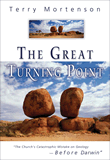
Is Young Earth Creationism Divisive?
Does young earth creationism have a tendency to become a source of division among believers? Mark Looy, AiG–U.S., responds to this important question.
I was part of a Christian fellowship for the better part of sixteen years. Through all that time we did not have a stated stand on Genesis one. In the first half of 2009 some of the women of the congregation were radicalized by your young earth ministry materials. This lead to much controversy and the adoption of [removed per feedback rules concerning denominational positions] to back up the Young Earth view. Study of the underlying Hebrew of Genesis was deemed off limits and not part of a "level playing field". Needless to say this lead to a split as this version of Young Earth Creationism became a test of fellowship, perhaps even of salvation.?
The fall out of all this is that I can have no contact with my son, his wife and my grandchildren. Radical Young earth Creationism is divisive. It eclipses God's gospel of grace and makes the when and the how more important than the who and the why.
Sincerely, H. N.
Dear H. N.,
Thank you for your email.
I’m sorry to hear about the family difficulties. But I wish to point out that family divisiveness is not a direct outgrowth of accepting the historicity of Genesis (where the family was first instituted, as you know). People’s reactions to a doctrine can be another matter, of course. But the teaching of a young earth from Genesis, in and of itself, does not lead to division. There is no cause-and-effect relationship.
At the same time, we do point out that most Christian doctrines (sin, atonement, need for a Savior, why there is death in the world, why human life is sacred, why we wear clothing, etc.) are founded in a literal Genesis, and so it is essential to stand up for the authority of the Bible’s first book, along with the rest of Scripture. I would submit that when “old-earthers” do not adhere to the doctrine of creation and other clear teachings (e.g., no death before Adam) as found in Genesis, their teachings can be used in a divisive way as they insert their compromise into the church.
The Apostle Paul wrote the following about those who cause divisions in the church:
Now I urge you, brethren, note those who cause divisions and offenses, contrary to the doctrine which you learned, and avoid them. For those who are such do not serve our Lord Jesus Christ, but their own belly, and by smooth words and flattering speech deceive the hearts of the simple. (Romans 16:17–18)
Before we rush to judgment and start avoiding fellow believers, we need to keep Paul’s words to Timothy in mind:
All Scripture is given by inspiration of God, and is profitable for doctrine, for reproof, for correction, for instruction in righteousness, that the man of God may be complete, thoroughly equipped for every good work. (2 Timothy 3:16–17)
The first passage seems to be directed at the leaders of divisive (unbiblical) teachings. If we automatically shun someone who disagrees with us (even if we are right), then how can we use Scripture to correct and reprove those who are wrong? All believers need to learn to be gracious toward one another, just as Christ has been gracious to us.
A study of both First and Second Corinthians provides a great example of how to handle these issues. Paul was stern, yet loving, toward the Corinthians in his first letter because they had been engaging in all sorts of sin (divisiveness, suing fellow believers, immorality, etc.). In the second letter, Paul rejoiced with the Corinthians who, for the most part, had followed his stern, yet loving rebuke.
“Young-earthers” did not start the division since a young earth was the main view of the church for 1800-plus years.
Historically, the controversy within the church over the age of the earth was not something young-earth creationists started. Virtually no Christian believed the earth was millions of years old until the secularists’ long-age beliefs started affecting the church in the early 1800s. Sadly, many church leaders allowed secular views to modify sacred text. Therefore, it is clear that “young-earthers” did not start the division since a young earth was the main view of the church for 1800-plus years. The divisiveness entered the church through “old-earthers” who were influenced by Lyell, Hutton, and others.
By the way, we encourage people to study the Greek and Hebrew words of the Bible and also read the context and literary style to get the intent of the authors who were guided by God’s Spirit as they wrote the 66 books of the Bible.
Lastly, the preaching of the gospel is the most important focus of our ministry. A tour of our Creation Museum would make that clear. Believing in a young earth is secondary to the gospel; please, where have we ever stated otherwise?
We have not forced our views on anyone. People make their own decisions. And though it is sad to hear of family friction in your situation, our position on what Genesis teaches can’t be blamed.
Grace be upon you,
Mark Looy
CCO, AiG–U.S.
Recommended Resources

Answers in Genesis is an apologetics ministry, dedicated to helping Christians defend their faith and proclaim the good news of Jesus Christ.
- Customer Service 800.778.3390
- Available Monday–Friday | 9 AM–5 PM ET
- © 2026 Answers in Genesis






